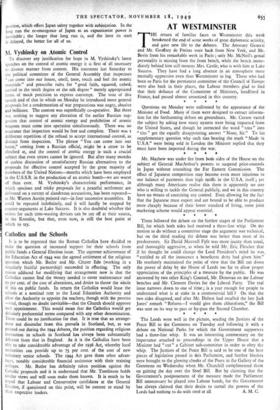AT WESTMINSTER
THE return of familiar faces to Westminster this week betokened the end of some weeks of great diplomatic activity, and gave new life to the debates. The Attorney General and Mr. Geoffrey de Freitas were back from New York, and Mr. Kevin from his remarkable week in Paris ; only Mr. McNeil's genial personality is missing from the front bench, while the bench imme- diately behind him still mourns Mrs. Castle, who is with him at Lake Success. They have had a long absence in an atmosphere more mentally oppressive even than Westminster in fog. Those who had
been to Paris for the permanent committee of the Council of Europe were also back in their places, the Labour members glad to find that their defiance of the Committee of Ministers, headlined in France, had passed almost unnoticed in this country.
* • • • Questions on Monday were enlivened by the appearance of the Minister of Food. Many of them were designed to extract informa- tion for the forthcoming debate on groundnuts. Mr. Carson varied the subject by asking how many oysters were being imported from the United States, and though he corrected the word " tons " into " tins " got the equally disappointing answer "None, Sir." To his supplementary question why such tins bearing the mark " Made in U.S.A." were being sold in London the Minister replied that they must have been imported during the war. * * * • Mr. Mayhew was under fire from both sides of the House on the subject of General MacArthur's powers to suspend price-controls in Japan without consulting the Far Eastern Commission. The effect of Japanese competition may become even more injurious to our balance of payments than high tariffs in the U.S.A. itself ; yet although many Americans realise this there is apparently no one who is willing to tackle the General publicly, and we in this country have no means of exercising any control. Even allowing for the fact that the Japanese must export and are bound to be able to produce more cheaply because of their lower standard of living, some joint marketing scheme would appear essential. * * * * There followed the debate on the further stages of the Parliament Bill, for which both sides had received a three-line whip. On the motion to do without a committee stage the argument was technical, but on the third reading the debate was better than most of its predecessors. Sir David Maxwell Fyfe was more jaunty than usual, and thoroughly aggressive, as when he told Mr. Eric Fletcher that if he thought he could change the Lord President's mind he was, "entitled to all the innocence a beneficent deity had given him." He resolutely maintained the point of view that the Bill cut down the power of delay by the House of Lords too far to allow proper appreciation of the principles of a measure by the public. He was answered by two other King's Counsel, Mr. Donovan on the Labour benches and Mr. Clement Davies for the Liberal Party. The real issue narrows down to one of time ; is a year enough for people to understand what is at stake in a controversial bill ? On that the two sides disagreed, and after Mr. Dalton had recalled the late Jack Jones' remark "Reform—I would give them chloroform," the Bill was sent on its way to pass or by-pass the Second Chamber. * a * • The Lords were well in the picture, sending the Justices of the Peace Bill to the Commons on Tuesday and following it with a debate on National Parks for which the Government supporters had a three-line whip. It was an interesting commentary on the importance attached to proceedings in the Upper House that a Minister had "cut" a Cabinet sub-committee in order to obey the whip. The Justices of the Peace Bill is said to be one of the best pieces of legislation passed in this Parliament, and further blushes were brought to the glowing cheeks of the Peers in the Gallery of the Commons on Wednesday when Mr. Churchill complimented them on gaining the day over the Steel Bill. But by claiming that the Government's postponement of the measure made the Parliament Bill unnecessary he played into Labour hands, for the Government has always claimed that their desire to curtail the powers of the Lords had nothing to do with steel at all A. M. C.














































































 Previous page
Previous page